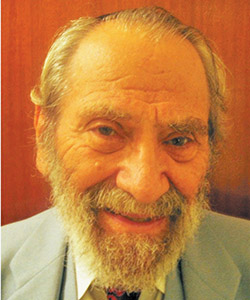
Fair Lawn—Congregation Shomrei Torah hosted a special dinner in honor of its unique member, Dr. Ira Cochin. Cochin, 90, was honored last week for overcoming the challenges of blindness and deafness to teach at the New Jersey Institute of Technology and publish 15 books. The dinner was held on the same night Rabbi Dr. Abraham J. Twersky and Rabbi Mordechai Willig gave talks hosted by Torah Web.
“It’s wonderful because I’m the oldest member of this synagogue!” Cochin said. “I came here when Rabbi [Benjamin] Yudin came; we both started together. I’ve been with this synagogue for 44 years.”
How did Cochin manage to teach engineering even while he was disabled? Cochin said he was “quite inventive—I made a lot of devices that helped me mainstream. They’re very complicated. When I became blind, but when I was not yet deaf, I studied Braille, and I had a device with a camera. I could point the camera at something, and then it would give me a picture on my hand.”
His biggest challenge while teaching was “communicating with the students. I practiced a lot, writing on the blackboard, even when I was blind. I liked to write in a nice straight line. But what if I make a mistake? The student nearest me would tap on the wooden floor… I could feel it.” He designed a code with his students to signify where to move his hands and where to stop. While teaching at NJIT, “I opened a laboratory,” known as the macrolab, where I helped… blind people, handicapped people” with the help of grants.
Rabbi Yudin introduced Dr. Cochin as an “incredible human being. Tonight, we’re going to give him the opportunity to be front-and-center.”
Before Cochin came forward, ophthalmologist Dr. Leonard Press talked to the audience about how he looked at Cochin’s medical records and history, and figured out how Cochin could restore his sight. “The fact that other people basically dismiss Doc,” he said, “is because, I think, they didn’t know Doc. I think it was my serendipity that I was lucky enough to know him….”
Cochin also talked about the Holocaust and how it affected him and those he met in his macrolab, as well as the challenges and successes he’s faced over the years. He was the first and one of very few students who earned a Ph.D. at the Cooper Union to receive a Ph.D., but his future was thrown into doubt when he became blind in 1972. One way he coped, he said, was by studying Braille and even “Hebrew Braille… in the synagogue so I was able to follow the Hebrew readings… The gabbai invited me to lead the congregation on Shabbos.” Singing with the congregation was “an unexpected delight for the congregation and me.”
After his speech, Dr. Cochin signed copies of his newest book, Tales of the Holocaust. Published this past November, the book tells the story of Philip Gringul, a mutilated Holocaust survivor who heard about Cochin’s macrolab. Using the lab’s specially equipped computers and devices, he was finally able to tell Cochin his story.
Rabbi Willig opened the Torah Web seminars with a talk on “What I Do Versus What I Am.” The conflict facing us today, he said, is to figure out what truly defines us. Are we defined by our work, the jobs we do, or by how much Torah we study? Our main goal, Rabbi Willig said, should be to “be happy with what you are doing, whatever parnassah, job you have, and be… with your community. Torah and mitzvos—that is exactly what defines us. That is what I am. What I do [as a career] holds no importance.”
Rabbi Dr. Twerski spoke about “Middle Age and Beyond.” He said it is important to discuss it and to see the advantages it offers, even in society’s “youth-valuing culture.”
“I admire… the fact that [Cochin] is a man that at one point was blind and deaf, and yet was able to do so much,” said Oren Hiller, the shul’s president. “He has gone past his handicap… He comes to shul, on most Shabbosim he’s here. The ability to be able to do those kinds of things are things I really admire in someone.”
By Oren Oppenheim








